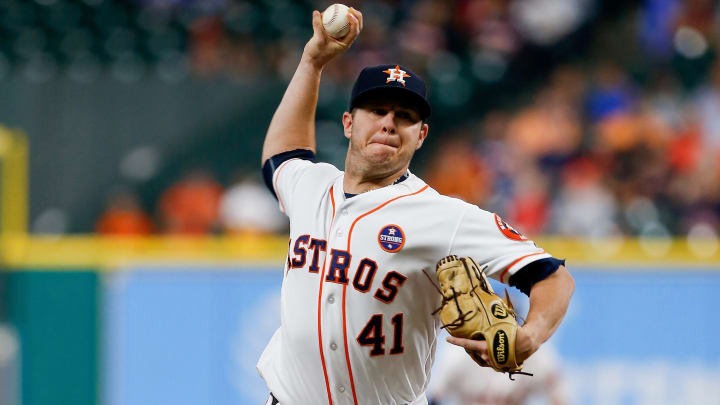The Astros Need to Use Brad Peacock if They Want to Beat the Yankees in the ALCS

NEW YORK —From a tactical perspective, Tuesday evening’s ALCS Game 4 went nearly perfectly for Astros manager A.J. Hinch. The skipper's decision, announced late Monday night, to start Lance McCullers, Jr.—even though the 24-year-old All-Star was winless, with an 8.03 ERA, since June 24—was the right one. McCullers allowed two hits over six innings, and yielded his only run on his 81st and last pitch, which the Yankees’ Aaron Judge blasted over the centerfield fence to lead off the top of the seventh. “I wasn’t healthy,” McCullers said of his recent struggles, “and I was healthy today.”
Hinch’s decision to follow McCullers with Chris Devenski to face Didi Gregorius, Gary Sanchez and Greg Bird? The right one. Devenski, also an All-Star, allowed lefthanders to bat .111 against him this year, and Gregorius and Bird both swing from the left.
His decision to turn to Joe Musgrove next? The right one. Since he became a reliever, in mid-July, Musgrove had been one of the most dominant in the league, with a 1.44 ERA.
Yankee Stadium Conjures its Old Spirit in Yankees' Raucous Game 4 Win Over Astros
His attempt to close out the game with two innings of work from Ken Giles? Reasonable. Giles saved 34 of 38 attempts this season, and was a strikeout artist facing a lineup with a tendency to strike out.
Procedure, though, matters little this time of year. Outcomes are what count. And the outcomes of Hinch’s moves, apart from starting McCullers, were disastrous. When Devenski entered, the Astros held a 4-1 advantage, and seemed certain of emerging with a 3-1 series lead—a likely insurmountable one, with Dallas Keuchel and Justin Verlander lined up to start the next two games. By the time Giles departed, the Yankees led 6–4, with the AL pennant a genuine tossup. That was the result of the work turned in by Devenski, Musgrove and Giles, who allowed twice as many baserunners (eight)—and more runs (five)—than they recorded outs (four).
This is not to second-guess Hinch’s tactics in Game 4, but to first-guess them going forward—starting with Wednesday’s Game 5. “I don’t think there’s anyone that’s losing their job over this,” Hinch said on Tuesday. “They’re the guys we’re going with. These guys are getting outs. They have gotten outs for us all season.”
That’s difficult to take at face value, for a few reasons. One: Hinch has already shown a willingness to deviate from the way he used his relievers all season—as well he should, as the Astros’ bullpen proved its one soft spot this year, with a combined 4.27 ERA, 17th in the league. He called upon Giles to work more than one inning just four times during the regular season, but has already done so twice in the postseason— three times, if Tuesday had worked out. While the tactic didn’t backfire until Game 4, Giles has yet to turn in a scoreless appearance in any of his four playoff outings. He might be an excellent closer, but he is not Kenley Jansen or Andrew Miller. He's definitely not Aroldis Chapman.
Gary Sanchez Adds Another Dimension to Yankees' Postseason Power
Two: Hinch has another weapon to turn to, one who struck out 11.5 batters per nine as a reliever this year, and one who has yet to throw a single pitch in the ALCS. Hinch had good reason to keep Brad Peacock glued to the bench for the series’ first three games: he would have started Game 4 had McCullers not proved finally healthy, and he would have been a fine option in that role. Peacock went 10–2 as a starter this year, with a 3.22 ERA.
But if there is one quibble to be had with Hinch’s managing on Tuesday, it was that he did not turn to Peacock at all—if not instead of Devenski, with that pocket of lefties coming up, then to start what turned out to be a four-run eighth inning.
Hinch’s plan, clearly, was to use Peacock in case McCullers faltered early. When that didn’t happen, Hinch showed little intention of using him; he was only called upon to throw a few warm-up pitches in the bullpen. “These guys have been doing it all year, their roles,” he said. “It went to a ‘T,’ what their roles were.”
This season, though, the previously middling 29-year-old developed a genuine weapon—a new slider—which was, according to FanGraphs, the league’s 15thbest among pitchers who worked more than 100 innings, and which might prove the ideal antidote to the Yankees’ fastball-hunting sluggers. It was particularly effective on the first time the long reliever-turned-starter faced batters in a given outing: their first looks at Peacock produced a batting average of just .144 this year.
Ideally, for the Astros, Keuchel and Verlander will perform as expected—and as they did in Games 1 and 2—and require only a few outs from Giles, if any at all, to propel the Astros to their first World Series since 2005. But what is supposed to happen rarely does in October, and even the most logical of tactics don’t often produce the desired results. “I’m ready for anything, whatever they need me to do,” says Peacock. After Tuesday night, what Hinch—who has exhausted his other options—now needs from Peacock is clear: to be his relief ace.

Ben Reiter is a senior writer for Sports Illustrated and for SI.com who has been with the magazine since 2004.